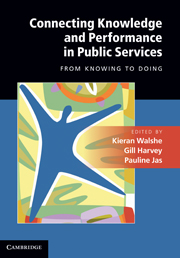Book contents
- Frontmatter
- Contents
- List of figures
- List of tables
- List of boxes
- Notes on contributors
- Foreword
- 1 Introduction: knowledge and performance – theory and practice
- 2 Knowledge from inspection: external oversight and information to improve performance
- 3 How is information used to improve performance in the public sector? Exploring the dynamics of performance information
- 4 Citizens, users or consumers: the voice of the public and its influence on improving performance
- 5 Competition and choice: the place of markets in connecting information and performance improvement
- 6 The role of corporate governance and boards in organisational performance
- 7 Change at the top: connecting political and managerial transitions with performance
- 8 The role of leadership in knowledge creation and transfer for organisational learning and improvement
- 9 Process Improvement and Lean Thinking: using knowledge and information to improve performance
- 10 Using evidence: how social research could be better used to improve public service performance
- 11 Absorptive capacity: how organisations assimilate and apply knowledge to improve performance
- 12 Knowing through doing: unleashing latent dynamic capabilities in the public sector
- 13 Conclusions: a puzzle, three pieces, many theories and a problem
- Index
- References
7 - Change at the top: connecting political and managerial transitions with performance
Published online by Cambridge University Press: 05 July 2011
- Frontmatter
- Contents
- List of figures
- List of tables
- List of boxes
- Notes on contributors
- Foreword
- 1 Introduction: knowledge and performance – theory and practice
- 2 Knowledge from inspection: external oversight and information to improve performance
- 3 How is information used to improve performance in the public sector? Exploring the dynamics of performance information
- 4 Citizens, users or consumers: the voice of the public and its influence on improving performance
- 5 Competition and choice: the place of markets in connecting information and performance improvement
- 6 The role of corporate governance and boards in organisational performance
- 7 Change at the top: connecting political and managerial transitions with performance
- 8 The role of leadership in knowledge creation and transfer for organisational learning and improvement
- 9 Process Improvement and Lean Thinking: using knowledge and information to improve performance
- 10 Using evidence: how social research could be better used to improve public service performance
- 11 Absorptive capacity: how organisations assimilate and apply knowledge to improve performance
- 12 Knowing through doing: unleashing latent dynamic capabilities in the public sector
- 13 Conclusions: a puzzle, three pieces, many theories and a problem
- Index
- References
Summary
Introduction
There is relatively little research that systematically assesses how changes in political or managerial leadership contribute to public service performance, and even less on the question of how the effectiveness of these leaders is related to their use of performance information. This gap in knowledge is surprising because the idea that new leadership can transform the performance of public services has not only been seen as theoretically important for a long time, it has also become a popular policy nostrum in recent years. Local authorities have increasingly tried to recruit new (and, by assumption, better) political and managerial leaders. The idea of effective leadership has been a key theme of recent UK initiatives, with many new bodies with leadership in their titles, including a Leadership Centre for Local Government, a National College for School Leadership and a Leadership Foundation for Higher Education. Moreover, leadership is now a key competency for senior civil servants. The common denominator of these reforms is an attempt to improve the leadership capacity in local government, health bodies, education and other public services to improve the services these organisations provide.
Debates on the need for better leadership in UK local government reflect a longstanding concern with the ‘calibre’ of councillors and officers (Dearlove 1979). The basic argument is that the succession of political and managerial elites may reinvigorate public service providers and their performance (Boyne and Dahya 2002; Boyne 2003).
Information
- Type
- Chapter
- Information
- Connecting Knowledge and Performance in Public ServicesFrom Knowing to Doing, pp. 128 - 144Publisher: Cambridge University PressPrint publication year: 2010
References
Accessibility standard: Unknown
Why this information is here
This section outlines the accessibility features of this content - including support for screen readers, full keyboard navigation and high-contrast display options. This may not be relevant for you.Accessibility Information
- 3
- Cited by
